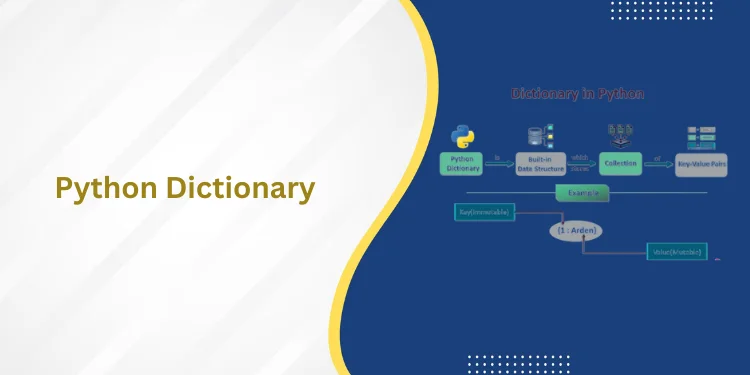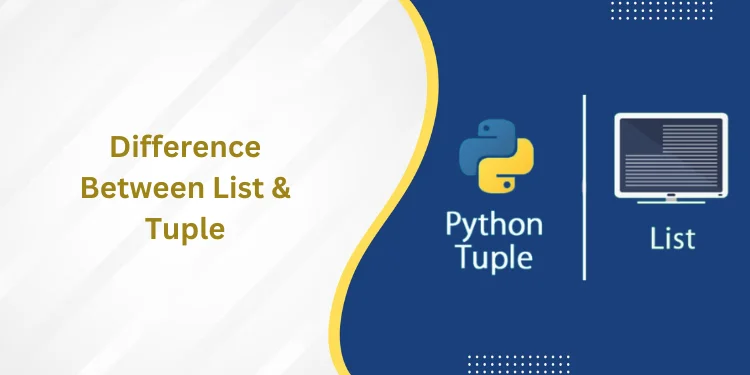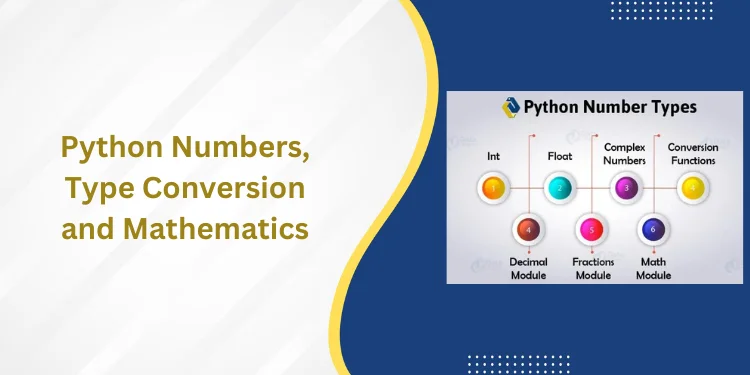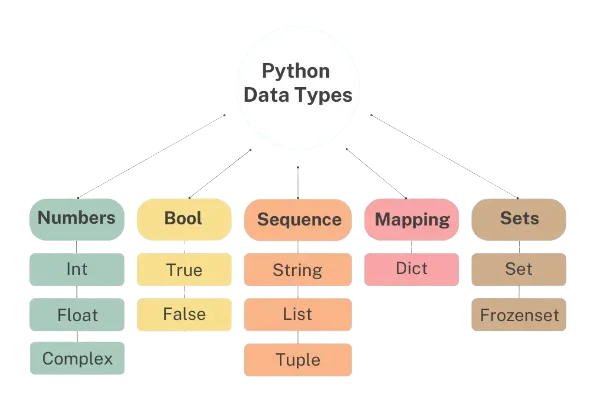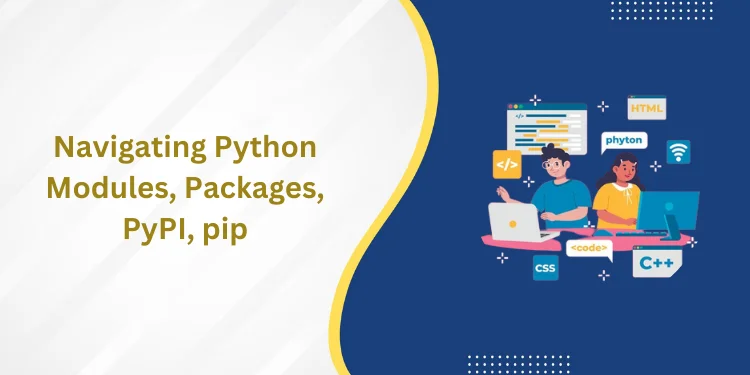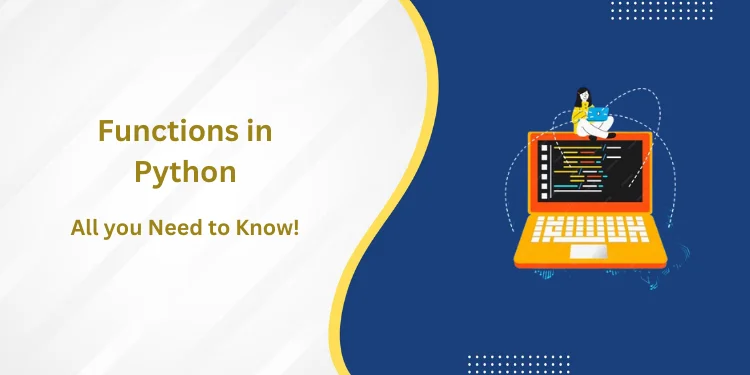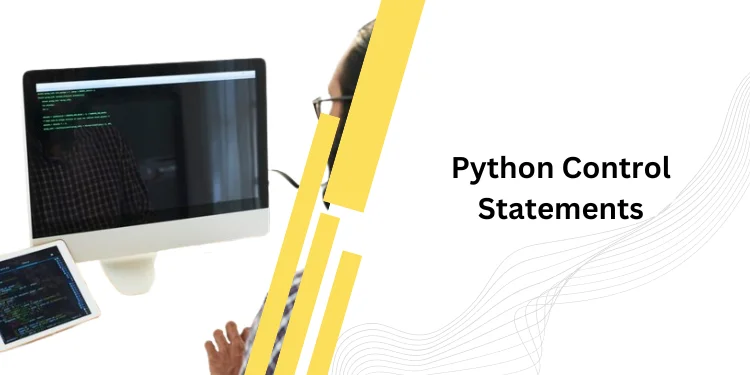Table of Contents
ToggleIntroduction
Among developers, the topic of Difference Between C and C++ is a common blog topic. Programming languages like C and C++ can be used to create a variety of software, including operating systems, databases, GUI programs, and games. C++ is an enhanced version of the programming language C, which is referred to as the “God of programming languages.”
What is C?

Dennis Ritchie, a computer scientist, created the procedural or structural programming language C at Bell Laboratories in 1972. C is a fundamental programming language that may be used to create complicated programs like the Python interpreter, Difference Between C and C++, Git, Oracle Database, MySQL code, Adobe, and Apple OS X in addition to operating systems like Windows and Apple OS X. The procedural nature of C prevents it from supporting objects or classes.
The popularity of C can be attributed to its simplicity, speed, Difference Between C and C++, and adaptability. It served as the foundation for numerous additional programming languages. It is simple for a user to learn all other programming languages if they are familiar with C.Difference Between C and C++, Since C is a case-sensitive language, capital and tiny letters are handled differently.
Read about: masters in data science India
Features of C Language
- Procedural or Structural Language: Every program has a specific flow to execute the code, and as C is a procedural programming language, Difference Between C and C++, it divides the code into smaller modules to reduce the program’s complexity.
- Dynamic Memory Allocation: The memory can be allocated dynamically in C, Difference Between C and C++, allowing for run-time memory allocation. Programmers benefit from it since they are often unaware of how much memory or space will be needed to execute a piece of code.
- Simple and Portable: The best programming language for beginners is C because it serves as the foundation for many others. Difference Between C and C++, The explanation is clear and simple. Difference Between C and C++, The C programming language is also machine-independent, allowing you to create your code on one platform and run it on another to make changes or updates.
Example Program of C
C
#include<stdio.h>
int main(){
int x, y, sum=0;
printf(“Enter the two integers x and y: “);
scanf(“%d %d”, &x, &y);
// calculating sum of two integer
sum = x + y;
printf(“%d + %d = %d”, x, y, sum);
return 0;
}
Click here to know more about: data analyst course in Bangalore
What is C++?
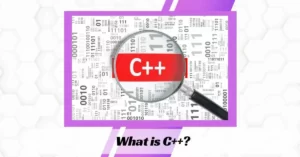
Programming language C++, which is all-purpose and object-oriented, was also referred to as “C with Classes.” Difference Between C and C++, This language was designed in 1979 by Bjarne Stroustrup. Difference Between C and C++, Because it supports both procedural and object-oriented programming languages, it is a multi-paradigm programming language.
The C programming language’s features, together with classes and objects for user-defined data types, are all present in C++. Difference Between C and C++, Operating systems, smartwatches, game development, cloud distributed systems, compilers, etc. all employ C++.
Today’s leading tech titans, like Google, Meta, Amazon, and many others, use C++. Difference Between C and C++, It is no longer just a C extension; with a recent update and outstanding performance, it has evolved into a well-liked and in-demand programming language.
Features of C++ Language
- Object-Oriented Language (OOPs): As an object-oriented language, C++ features attributes like classes, objects, polymorphism, inheritance, encapsulation, abstraction, data hiding, and so forth. The OOPs ensure the flexibility of the code, Difference Between C and C++, prevent data duplication, and aid in the effective problem-solving.
- Compiler-Based: C++ is faster than Java and Python because it is a compiler-based programming language, which means C++ programmes must be compiled before they can be run.
- Dynamic Memory Allocation: Memory can be dynamically allocated in C++, Difference Between C and C++, i.e., at runtime. The size of the necessary memory can be determined at run time because, most of the time, Difference Between C and C++ the programmer is unaware of how much memory would be needed to hold the specific information in the declared variable.
Example Program of C++
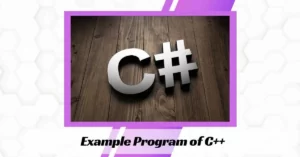
C++
#include<iostream>
using namespace std;
void main() {
int a, b, sum=0;
cout<<“Enter the value for two integers: “;
cin>>a>>b;
// sum of two numbers in stored in variable sum
sum = a + b;
// prints the sum of two numbers
cout<<a<< ” + ” <<b<< ” = ” <<sum;
return 0;
}
Similarity Between C and C++
- The code structure is comparable in C and C++.
- Both of them share the same compilation.
- Additionally, they use similar coding syntax.
- Although C++ has a longer syntax than C, the fundamentals are the same.
- The hardware and their memory model are quite similar.
Difference Between C and C++
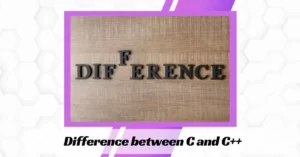
Parameter | C | C++ |
Programming Paradigm | A procedural or structural programming language is C. | C++ is an object-oriented and structured programming language. |
History | Dennis Ritchie, a scientist at Bell Laboratories, created C in 1972. | Bjarne Stroustup created C++ in 1979.. |
Keywords | There are 32 keywords in C. | There are 63 keywords in C++. |
Data Types | Built-in data types are supported in C. | built-in and user-defined data types both are supported in C++. |
File Extension | The C programming language’s file extension is .c | The C++ programming language’s file extension is.cpp |
Header File | The C language uses the <stdio.h> header file. | The C++ language uses the <iostream.h> header file |
Allocation and Deallocation of Memory | In the C programming language, we utilize the functions malloc (), malloc(), and free() to allocate and deallocate memory, respectively. | In the C++ programming language, we utilize the new operator for memory allocation and the delete operator for memory deallocation. |
Access Modifier | Access modifiers are not supported by the C language. | Access modifier support in C++ |
Security | C features security protections, making it susceptible to manipulation from outside sources. | As a result of its data concealing and encapsulation security features, C++ is a secure language. |
Reference Variable | Reference variables cannot be used in C. | Reference variables are supported in C++ |
Function Overloading and Function Overriding | Function overloading and function overriding are not supported in C. | Function overloading and function overriding are supported in C++ |
Program Division | Code written in C is separated into discrete units known as functions because it is a procedural language. | Since C++ is an object-oriented language, classes, and objects are used to organize the code. |
Inline Function | Inline functions aren’t supported in C. | Inline functions are supported in C++. |
Driven Type | A function-driven language is C. | An object driven language is C++ |
Compatibility | C++ compiler may run code written in C because C is the base language. | OOP is a notion that is included in the C++ language, thus C++ code can be run on a C compiler. |
Data and Function | In C, the data and function are separated as it is a procedural programming language | In C++, the data and function are encapsulated as it is a object-oriented programming language |
Application Development | C language is more suitable for low level implementation such as network driver, text editor, assembler, etc | C++ language is more suitable for high-level implementation such as game development, smartwatches, embedded systems, etc |
Allocation and Deallocation of Memory | The C language provides calloc() and malloc() for dynamic allocation of memory and free() for deallocation of memory. | The C++ language provides a new operator for the allocation of memory and a delete operator for the deallocation of memory. |
Exception Handling | It does not provide any direct support for exceptional handling. C language requires the usage of functions that support exception handling. | It provides direct support for exceptional handling. The C++ language uses a try-catch block. |
Type of Approach | C language follows a top-down approach. It functions to break down the main module into various tasks. Then it breaks these tasks into sub-tasks, and so on. | C++ language follows the bottom-up approach. It means that it first develops the lower-level modules and then moves on to the next-level modules. |
Function for Input/Output | The C language uses the scanf() and printf() functions for the input and output operations. | In the C++ language, it uses the cin and cout for the input and output operations. |
Source Code | Free-format program source code. | Originally developed from the C programming language. |
Relationship | C is a subset of C++. It cannot run C++ code. | C++ is a superset of C. C++ can run most of C code while C cannot run C++ code. |
Focus | Focuses on method or process instead of data. | Focuses on data instead of method or procedure. |
Encapsulation | Does not support encapsulation. As Data and functions are separate and free entities. | Supports encapsulation. Data and functions are encapsulated together as an object. |
Conclusion
You now know the difference between C and C++ from this article. The essential components of both programming languages, C and C++, Difference Between C and C++ were thoroughly discussed in this article. You carefully observed Object-Oriented Programming’s shortcomings in Procedural Programming and how it has been improved upon them.
Compared to C++, Difference Between C and C++, which is an extension of the C programming language with the OOP’s concept and is faster and more secure, C looks to be better suited for low-level programming applications and is also a good starting point for new programmers. Difference Between C and C++, Demand for the C++ programming language demonstrates the promising future for developers.
Frequently Asked Questions
Which one is better C or C++?
There are much more libraries and functions available in C++ than in C. C++ is a better choice if you’re dealing with sophisticated software because there are more libraries available to you. Practically speaking, understanding C++ is frequently necessary for a range of programming positions.
What is the relationship between C and C++?
Polymorphism, encapsulation, and inheritance are all supported OOPS concepts in C++, which is an object-oriented programming language. A subset of C++ is C. The superset of C is C++. Although all C++ code can run on C, the opposite may not always be true.
What is the main difference between C# and C++?
C# is a high-level language, but C++ is regarded as an intermediate-level language that extends C’s base language with object-oriented capabilities. Programmes are converted to machine code in C++, and to the Common Language Runtime, or CLR, in C#.
What is difference between C and C++ and Java?
Operator overloading, Goto statements, structures, pointers, unions, and other features are supported by C++. Operator overloading, Goto statements, structures, pointers, unions, and other features are not supported by Java. C++ cannot be interpreted; it can only be compiled. Java can be interpreted as well as compiled.
What is fastest programming language?
C is typically used for activities that must be completed quickly and require the programmer to deal with a minimum amount of runtime. The lack of features offered by other languages is the price paid for using C. C is the quickest language as a result.





